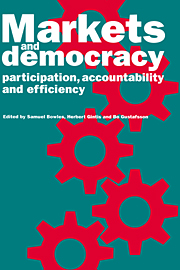Book contents
- Frontmatter
- Contents
- List of figures
- List of tables
- Preface
- 1 Post-Walrasian political economy
- Part I Agency, incentives, and democratic accountability
- Part II Institutions and institutional change
- 4 Toward a framework for analyzing institutions and institutional change
- 5 Imperfect choice and rule-governed behavior
- 6 Organizational equilibria and institutional stability
- 7 Agency problems and the future of comparative systems' theory
- Part III Conditions for the success of the democratic firm
- Part IV Productivity, distribution, and power
- Part V Ownership, participation and capital markets
- Part VI Political democracy and economic democracy
- Bibliography
- Author index
- Subject index
4 - Toward a framework for analyzing institutions and institutional change
Published online by Cambridge University Press: 05 March 2012
- Frontmatter
- Contents
- List of figures
- List of tables
- Preface
- 1 Post-Walrasian political economy
- Part I Agency, incentives, and democratic accountability
- Part II Institutions and institutional change
- 4 Toward a framework for analyzing institutions and institutional change
- 5 Imperfect choice and rule-governed behavior
- 6 Organizational equilibria and institutional stability
- 7 Agency problems and the future of comparative systems' theory
- Part III Conditions for the success of the democratic firm
- Part IV Productivity, distribution, and power
- Part V Ownership, participation and capital markets
- Part VI Political democracy and economic democracy
- Bibliography
- Author index
- Subject index
Summary
Introduction
In an era of major changes across the globe in economic as well as political institutions, there should be little argument about the need for an analytical framework to help us understand the observed phenomena. In the past, the development of such a framework was obstructed by imperfect communication between “theorists” and “institutionalists.” Our objective here is to facilitate communication by integrating institutional phenomena into models that have been developed for the study of economies, voting systems, and organizations. Primarily, we are interested in economic institutions, but certain aspects of the model are general enough to be applicable to political and other social institutions as well. Indeed, these non-economic aspects cannot be ignored, since introduction, implementation, and enforcement of the rules are essential features of the model.
Our point of departure will be the theory of economic mechanisms (formalized, for example, as adjustment processes or game forms). Although this theory has had a normative orientation, we intend our framework to be usable for descriptive and explanatory analysis as well. We do not share the view that at the present stage formalization is premature. It seems important to make institutional phenomena amenable to analysis with tools that have resulted in progress in many areas of economics and other social sciences.
Before proceeding with details, let us clarify the intended meaning of the term “institution.” In common parlance, this term has two distinct meanings. To illustrate by example, we refer to such organizational entities as a university, a central bank, an ombudsman's office, or a state as institutions.
- Type
- Chapter
- Information
- Markets and DemocracyParticipation, Accountability and Efficiency, pp. 51 - 67Publisher: Cambridge University PressPrint publication year: 1993
- 9
- Cited by



